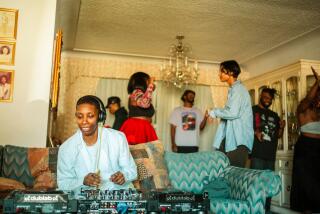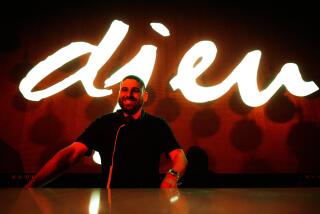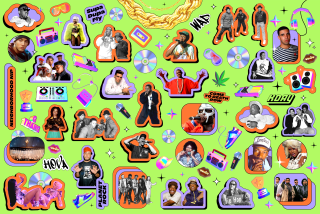Frankie Knuckles dies at 59; DJ helped create house music
- Share via
Frankie Knuckles, a record producer and disc jockey who helped develop the sound and culture of house music — a style of Chicago dance music that revolutionized club culture in the 1970s and ‘80s and resonates today — died Monday at his home in Chicago. He was 59.
The Cook County medical examiner confirmed his death but did not immediately specify the cause.
Knuckles, often called the “godfather” of house music, was instrumental in launching the electronic dance music movement in the late ‘70s from the Warehouse, a narrow club on Chicago’s Jefferson Street that was a sanctuary for the city’s gay community. He was also popularly known for his ‘80s and ‘90s remixes of hits by Whitney Houston, Depeche Mode, Diana Ross and Michael Jackson. As recently as 2008, he had a significant club track with his remix of Hercules and Love Affair’s “Blind.”
Knuckles split his time over the last few decades between Chicago and New York City, where he was born Francis Nicholls on Jan. 18, 1955. He learned his craft in New York during the early ‘70s while still a teenager, working alongside the well-known deejay Larry Levan. “We would spend entire afternoons working up ideas on how to present a record so that people would hear it in a new way and fall in love with it,” Knuckles once told the Chicago Tribune. “To us it was an art form.”
Even though disco dominated mainstream pop music, Levan and Knuckles took pride in digging further, finding deep album tracks drenched in gospel-soul feeling, a blend of deep emotion and lush orchestration with a more pronounced dance beat. Knuckles brought that knowledge and taste with him west to Chicago in 1977, first at the fledgling Warehouse club and later to another club, the Power Plant.
Two years after Knuckles arrived in Chicago, disco was sinking fast. In July 1979, between games of a Chicago White Sox double-header at Comiskey Park, radio deejay Steve Dahl blew up hundreds of disco albums.
“I witnessed that caper that Steve Dahl pulled at Disco Demolition Night, and it didn’t mean a thing to me or my crowd,” Knuckles said in an interview with the Chicago Tribune. “But it scared the record companies, so they stopped signing disco artists and making disco records. So we created our own thing in Chicago to fill the gap.”
Knuckles’ sets weaved together deep R&B, soul, gospel and club favorites by artists such as First Choice, Candido and Shirley Horn with British new wave and synth pop from New Order, the Human League and Depeche Mode. Sometimes he’d top off his mixes with snippets of speeches by Martin Luther King Jr. and other ministers. He would extend soul and R&B records and turn them into dance tracks, introduce new singles being produced by fledgling house artists and incorporate drum machines to emphasize the beat.
In addition to building dynamic ebb-and-flow sets that would keep his dance floor filled from midnight to noon on weekends, he would create theater-of-the-mind scenarios with inventive sound and lighting. “Sometimes I’d shut down all the lights and set up a record where it would sound like a speeding train was about to crash into the club. People would lose their minds,” Knuckles told the Chicago Tribune.
Primarily known as a deejay, Knuckles also played a key role as a tastemaker, de facto talent scout and producer. Knuckles bought his first drum machine from a young Derrick May, one of the founders of techno music, who regularly made the trip from Detroit to see Knuckles at the Warehouse. Knuckles helped sculpt and popularize classic house tracks such as “Tears,” with Robert Owens, and Jamie Principle’s “Your Love” and “Baby Wants to Ride.”
Knuckles once reflected on house music’s reputation as a soundtrack for hedonism, though much of the dance music he loved had a melancholy flavor, a yearning that evoked gospel and soul. He championed house music that wasn’t just about rhythm, but that embraced humanism and dignified struggle. It was in keeping with his belief that the dance floor was a haven for the gay, African American and Hispanic communities that first embraced him.
“God has a place on the dance floor,” he once told the Chicago Tribune. “We wouldn’t have all the things we have if it wasn’t for God. We wouldn’t have the one thing that keeps us sane — music. It’s the one thing that calms people down.
“Even when they’re hopping up and down in a frenzy on the dance floor, it still has their spirits calm because they’re concentrating on having a good time, loving the music, as opposed to thinking about something negative. I think dancing is one of the best things anyone can do for themselves. And it doesn’t cost anything.”
Kot is music critic at the Chicago Tribune.
More to Read
Start your day right
Sign up for Essential California for the L.A. Times biggest news, features and recommendations in your inbox six days a week.
You may occasionally receive promotional content from the Los Angeles Times.






